Key takeaways:
- Cryptocurrency wallets are essential for storing private and public keys, with hot wallets being online and cold wallets being offline.
- Hardware wallets offer enhanced security, combining the convenience of hot wallets with the protection of cold storage.
- Key benefits of hardware wallets include user control of private keys and support for multiple cryptocurrencies.
- Common challenges include the initial setup complexity, the need for physical security, and compatibility with various cryptocurrencies.
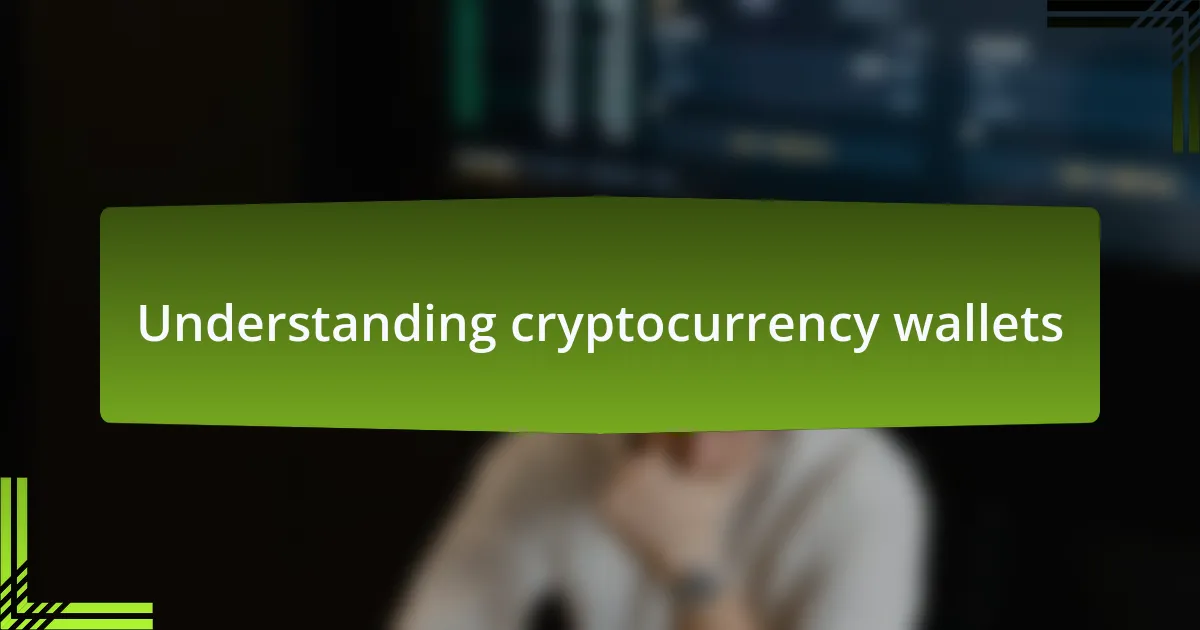
Understanding cryptocurrency wallets
When I first dove into the world of cryptocurrency, the concept of wallets completely puzzled me. I remember thinking, “Why do I need a wallet for digital money?” It turns out, these wallets are essential for storing my private and public keys, allowing me to access and manage my cryptocurrency safely.
The variety of wallets available can be overwhelming. You have hot wallets, which are connected to the internet, and cold wallets, designed to be offline. I’ve found myself choosing hardware wallets for long-term storage because they provide a sense of security that I don’t get with online options—it’s like keeping cash in a safe rather than carrying it in my pocket.
Have you ever lost access to something valuable? That’s a fear I had when I first started trading. Hardware wallets, in my experience, offer peace of mind; knowing my investments are safely stored offline provides a comforting barrier against hacking. They may not be as convenient for everyday transactions, but they give me confidence that my assets are protected, which is invaluable in the fast-paced crypto marketplace.
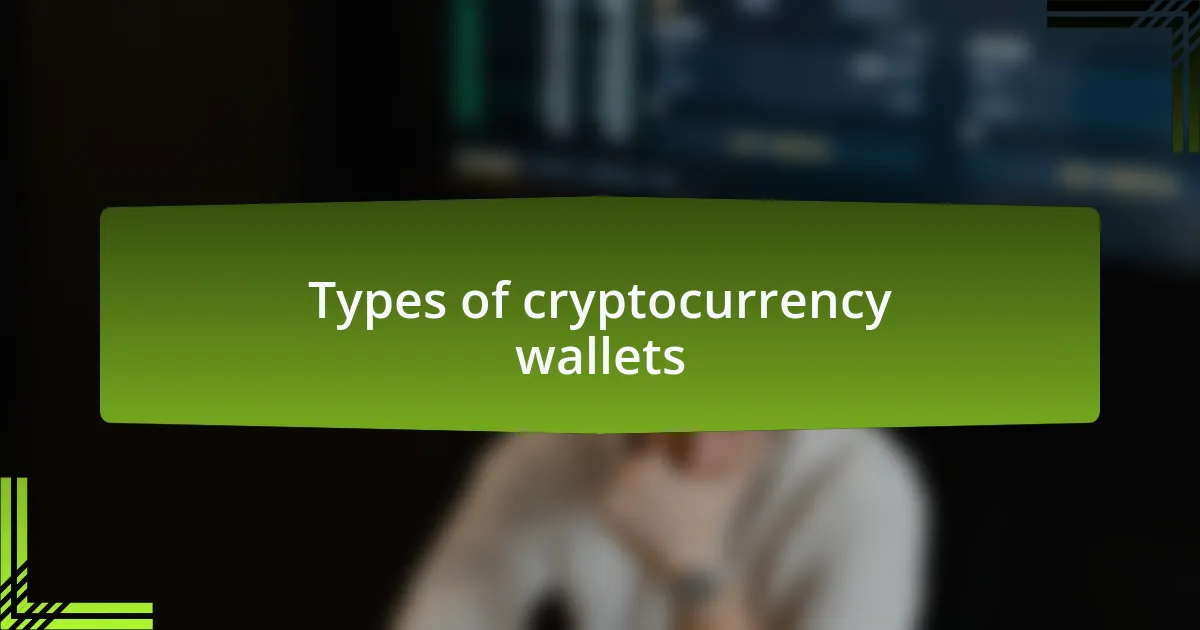
Types of cryptocurrency wallets
There are primarily three types of cryptocurrency wallets: hot wallets, cold wallets, and hardware wallets. Hot wallets, which I often use for day-to-day transactions, are connected to the internet, making them easy to access but also vulnerable to hacks. I once had a close call when a friend’s hot wallet was compromised overnight, which really drove home the need for careful management of online assets.
On the other side, cold wallets are completely offline and significantly enhance security. I remember the first time I used a paper wallet; writing down my private key felt daunting yet exhilarating. It was like holding a precious secret, emphasizing the importance of protecting that information with utmost care. Cold wallets are great for long-term storage, but they do require that extra level of responsibility.
Now, hardware wallets, like the ones I favor, marry the benefits of hot and cold storage. I appreciate how they provide a layer of convenience without sacrificing security. Whenever I use my hardware wallet, there’s a reassuring click that signals my assets are locked away from prying eyes, and I can’t help but feel a sense of empowerment. Isn’t it amazing how this simple piece of technology can offer such peace of mind?
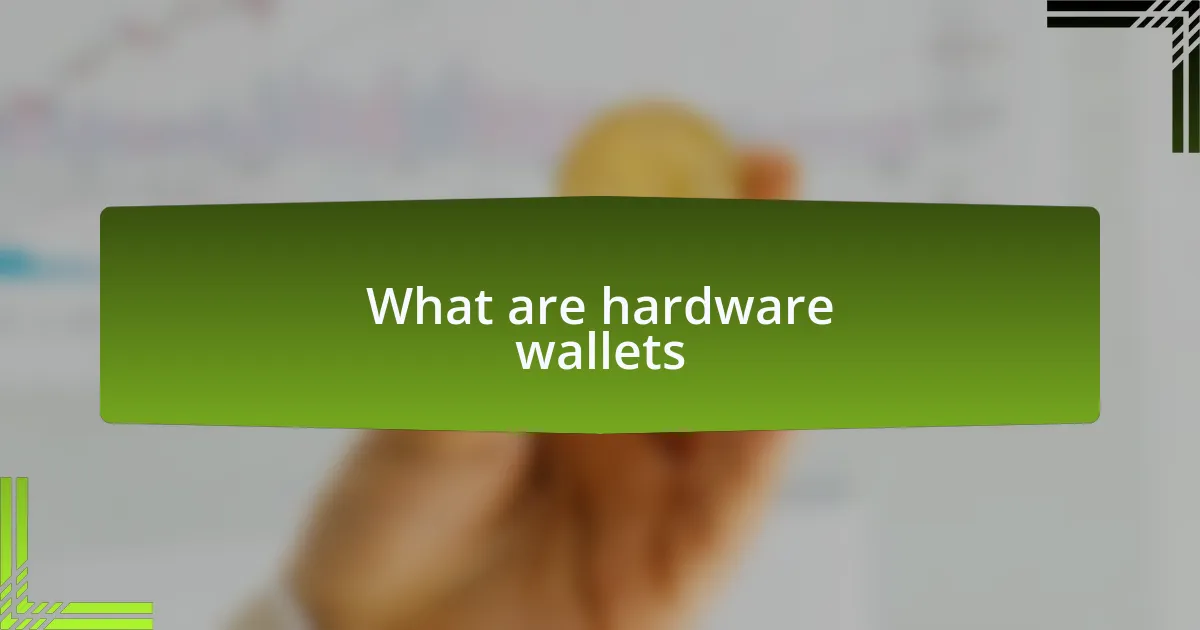
What are hardware wallets
Hardware wallets are specialized devices designed to store cryptocurrency securely offline. Unlike software wallets, which rely on internet connectivity, hardware wallets keep your private keys away from potential online threats. I recall the first time I set up my hardware wallet; it felt like I was locking my valuables in a safe, knowing no one could access them without my permission.
These wallets are compact and portable, making them easy to carry around, yet they pack a powerful punch in terms of security. I remember traveling and feeling a sense of relief knowing my investments were safe in my pocket, far from the dangers of public Wi-Fi connections. Have you ever debated whether to bring your crypto with you while on the go? With a hardware wallet, I never had to worry about that again; it made my decisions much simpler.
In my experience, a hardware wallet combines the best features of both hot and cold storage. When I use it, there’s a certain satisfaction in knowing that my funds are safeguarded against hacks, and that control rests firmly in my hands. Isn’t it comforting to know that with a few clicks, I can keep my investments secure?
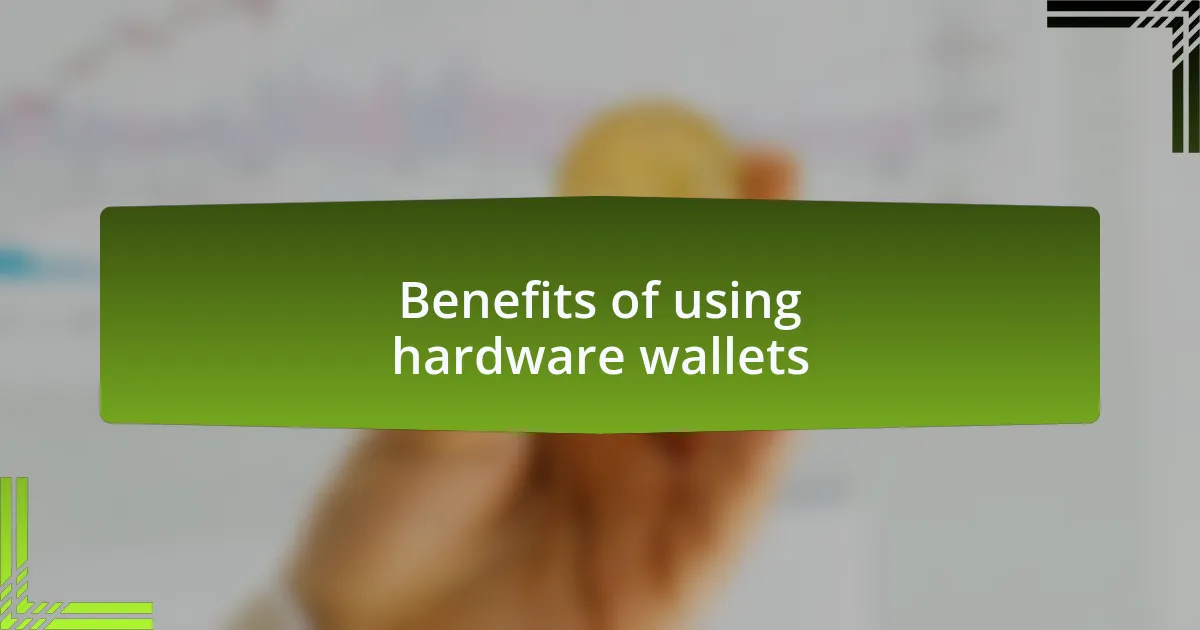
Benefits of using hardware wallets
One of the most significant benefits of using hardware wallets is the level of security they provide. When I first started investing in cryptocurrency, the sheer number of hacking stories sent chills down my spine. After I switched to a hardware wallet, I found it liberating to have my assets stored offline. It felt like having an impenetrable fortress protecting my investments from the chaos of the online world.
Another advantage I’ve noticed is the user control hardware wallets offer. With my first wallet, I experienced a profound sense of empowerment as I realized I was the sole custodian of my private keys. Have you ever felt anxious about trusting third parties with your investments? With a hardware wallet, I am the one in charge, and that autonomy is incredibly reassuring.
Moreover, hardware wallets often come with added features like multi-currency support and intuitive interfaces. I recall being pleasantly surprised when I discovered that my wallet could handle various cryptocurrencies seamlessly. This versatility made it a one-stop solution for my diverse portfolio, allowing me to manage everything in one secure device. Isn’t it comforting to know that you can have such comprehensive control over your digital assets in such an easy-to-use format?
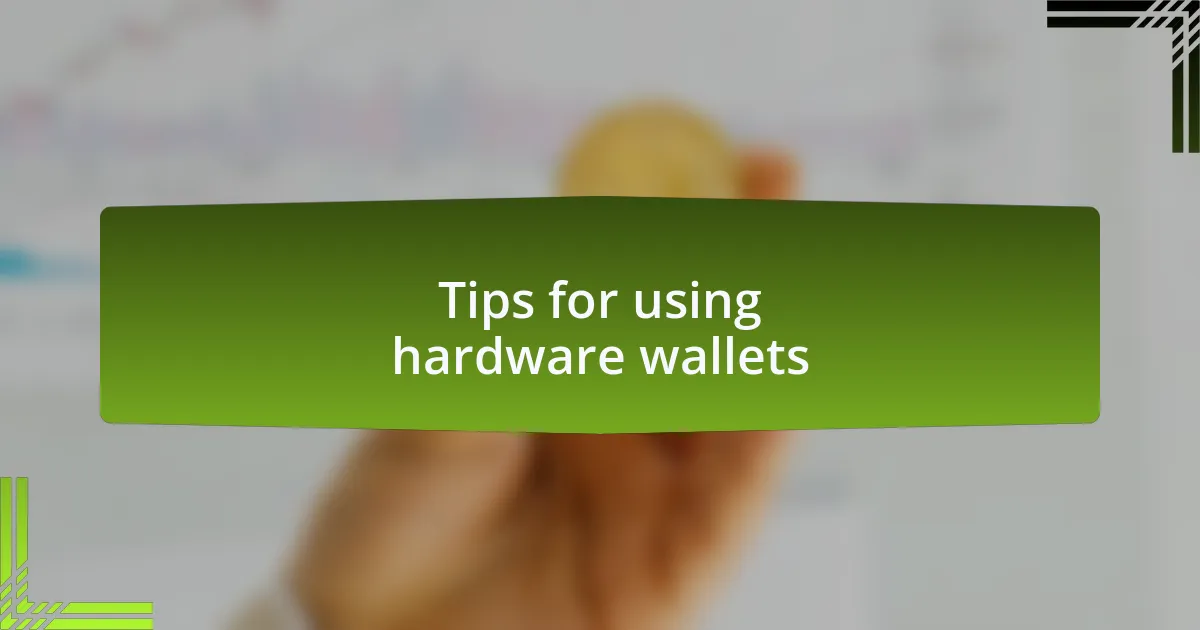
Tips for using hardware wallets
When using a hardware wallet, one of the first tips I’d suggest is to always keep your recovery phrase in a secure place. I learned this the hard way after a friend misplaced theirs, resulting in a significant loss. It’s almost like your wallet’s backup key, so treat it like that precious item you’d never leave unattended. Have you considered how you would protect something so vital?
Next, regularly updating your hardware wallet’s firmware is crucial. I remember feeling a bit hesitant the first time I saw a firmware update notification, but I realized it was an essential part of keeping my assets safe from vulnerabilities. Think of it like maintaining your car; regular check-ups make sure everything runs smoothly and securely. Are you taking the time to keep your wallet up to date?
Finally, always be cautious about phishing attempts. There was a moment when I almost clicked on a suspicious link pretending to be from my hardware wallet provider. Thankfully, I hesitated and double-checked the URL. This experience made me acutely aware of the need to be vigilant, because, in the crypto world, not everyone has your best interests at heart. Have you established a personal protocol to identify and avoid such risks?
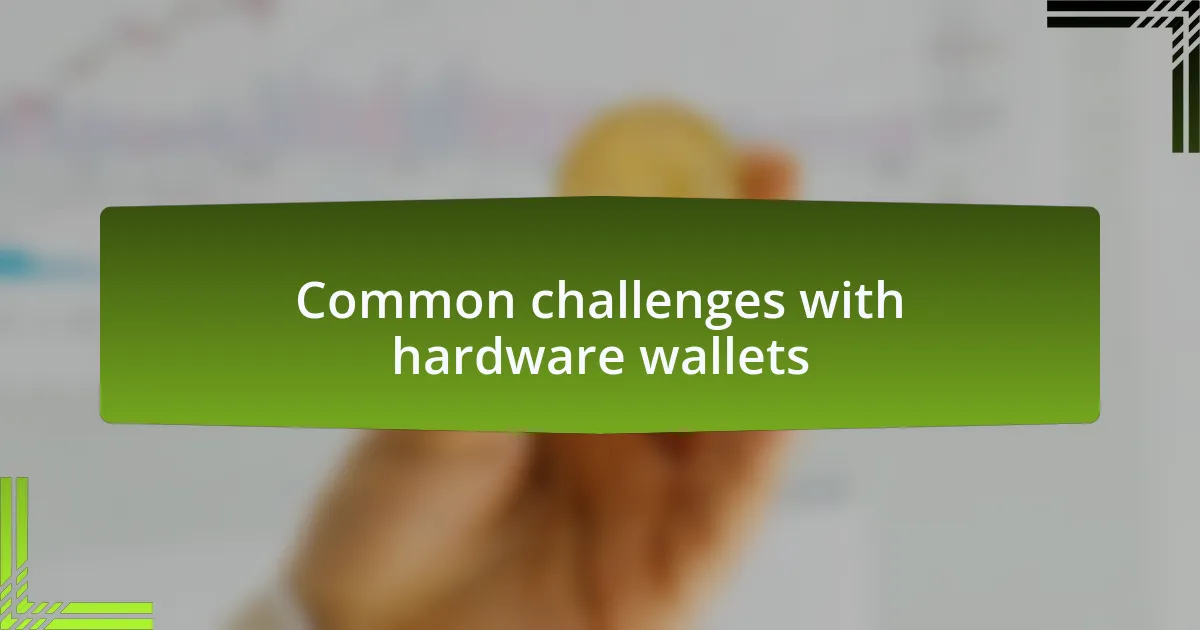
Common challenges with hardware wallets
The process of setting up a hardware wallet can be daunting. I remember my first attempt – I was overwhelmed by the initial configuration steps and spent hours double-checking every setting. It made me wonder: was I doing everything right? I realized that while it’s vital to follow instructions accurately, the learning curve is part of embracing this secure way of managing my cryptocurrency.
Another challenge I encountered involved the physical security of the wallet itself. I recall the anxiety I felt when I misplaced my wallet during a trip. Thankfully, it was retrievable, but it made me think about how easily these devices could be lost or stolen. Have you ever considered how you would secure your wallet in a public space? It’s a critical aspect that can’t be overlooked.
Lastly, the compatibility with various cryptocurrencies can sometimes lead to frustration. There were times when I found myself manually checking which coins my wallet supported, and it felt tedious. This experience highlighted the importance of researching before making a purchase. Isn’t it essential to choose a wallet that aligns with your cryptocurrency needs? It can save you a world of trouble down the line.